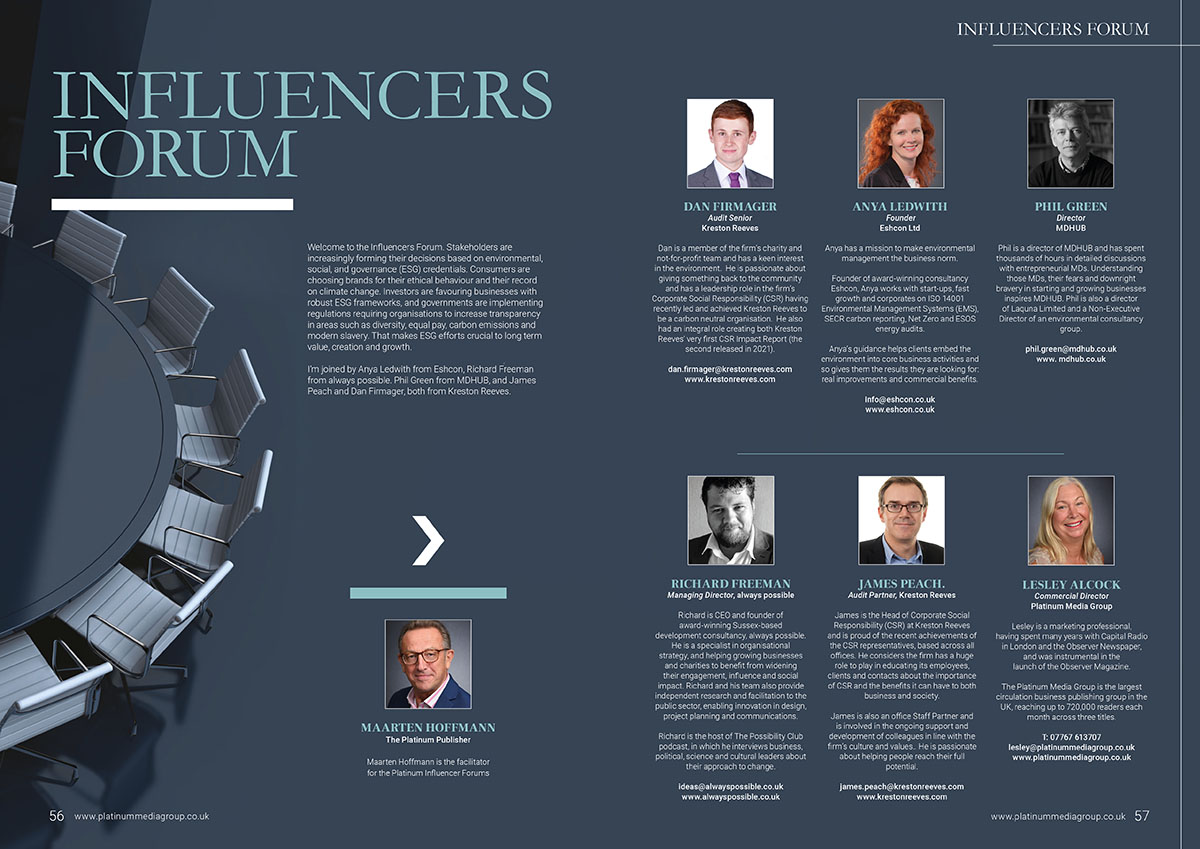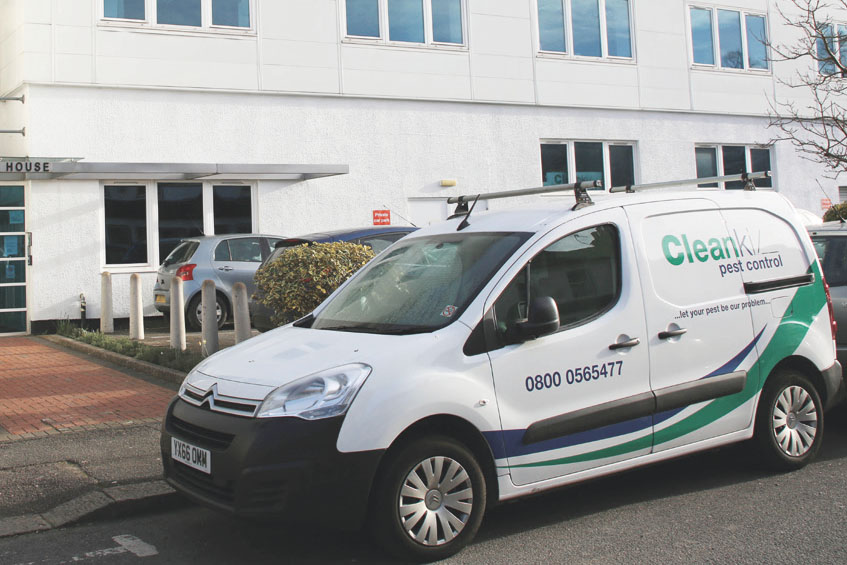
Welcome to the Influencers Forum. Stakeholders are increasingly forming their decisions based on environmental, social, and governance (ESG) credentials. Consumers are choosing brands for their ethical behaviour and their record on climate change. Investors are favouring businesses with robust ESG frameworks, and governments are implementing regulations requiring organisations to increase transparency in areas such as diversity, equal pay, carbon emissions and modern slavery. That makes ESG efforts crucial to long term value, creation and growth.
I’m joined by Anya Ledwith from Eshcon, Richard Freeman from always possible. Phil Green from MDHUB, and James Peach and Dan Firmager, both from Kreston Reeves.
Can I come to you first Anya if I may? How important is corporate social responsibility (CSR) and ESG to companies? And how do we get there?
AL: Having good environmental and social governance within an organisation is absolutely key to any business nowadays. There are so many commercial benefits to be gained, from improving your processes, finding efficiencies, and cost savings through to engaging with your customers and staff.
As for getting into it, ask the experts. Read this magazine and come up with various ideas! But this is more than just doing some nice things on the side. It’s about changing your processes to embed ESG within your organisation to get the true benefits.
Those are things we need to instil within companies. It’s not really a change of process. In many cases, it’s a brand new process, isn’t it?
AL: It’s not necessarily a brand new process. I work a lot with businesses on carbon. In order to calculate your carbon emissions and set net zero targets, you need to understand the energy that you’re using in your buildings, and business travel and so on.
James, how far down this road is Kreston Reeves in terms of ESG?
JP: Not as far as we’d like to be. We’ve done a lot of work in this area. The real standout point from a professional services firm is that we have probably done a lot more than other firms of our size.
We’ve always been proud of what we’ve done in the CSR arena. But it’s only really been the last couple of years that we’ve spent totally focussing on it. We’ve developed CSR impact reports over the last couple of years. And it’s only when you produce them that you actually see all the good things you’ve done.
Whether you want to focus on environmental issues, social matters, inequalities, diversity, there’s a lot to prioritise. But ultimately, we’ve seen some real benefits over the last couple of years in terms of helping with our people engagements, client engagements, and to some extent, with recruitment and retention of staff.
I find in some situations, the consumers are actually educating businesses in their demands, because the consumer base seems to be getting stronger in their demands of companies.
Richard, you’re quite involved in this environment. How important is ESG or CSR to our future?
RF: There is no future without it.
Being conscious of the decisions you’re making as an organisation is very important from top to bottom. I work with a lot of smaller businesses, scaling businesses, and ambitious SMEs that don’t have much of their ESG or CSR infrastructure in place yet. So it’s quite an exciting time to look at how they might do things differently compared to 10 years ago.
Data is critical. We’ve looked recently at the West Sussex coastal strip as a snapshot of how businesses are looking at this particular issue. 80% declared that they were doing something to reduce their carbon footprint, but 55% didn’t know what their carbon footprint was. So there’s a complete dissonance between what people are reporting they do without actually understanding the impact they’re having.
PG: What I’m seeing now with certain clients regarding the supply chain is they are being forced by their customers to implement ESG. And the customers, particularly big customers like supermarkets, are basically saying to them ‘…we have a problem. But actually, it’s your problem. So you tell us what you’re doing, and what we can then do is report to our shareholders about how brilliant we are, because we’re actually looking at scope three emissions’, for instance.
And I think for small companies, this is going to be an issue because they will just get that problem thrown at them by big customers and get told to ‘solve it for us’.
The other issue is that this should all come from a risk perspective. I recently heard about an institutional investor who said they will not look at any proposal unless it has an ESG audit alongside it already, before the proposal goes out. So anybody looking at the finances has got to get their ESG house in order first.
RF: It’s the same with public sector procurement. It’s going to become more important in terms of the threshold to be able to deliver any goods and services to the public.
PG: An environment analyst called recently, mentioning a similar sort of thing. And they were talking about companies needing to look at the environmental impact of their projects. You have to think about how things are going to affect the environment, as well as your own direct impacts from scope one, two, and three.
AL: The larger clients that I work with are beginning to engage far more with their supply chain. They’re saying, ‘Okay, we don’t have all the answers yet. This is fairly new, especially on the social side of things.’
But on the carbon emissions, it’s a developing methodology. None of the big businesses have all the answers, but they do need to take their supply chain with them, rather than finger-wagging at them saying ‘you’ve got to do it.’
This is a great opportunity for all businesses to understand how their organisation works, learn together, put in those efficiencies, focus on where they can improve, and then shout about it.
PG: My point was really that it will be forced upon businesses if they don’t do something. So step one is ‘do something’ if you can. But step two is if you don’t, they will start saying ‘we need this from you or you won’t be on the list because you can’t supply this information’.
Smaller companies could gain a competitive advantage by offering the same product or service as a competitor but in a more responsible way. And that can then become a marketing tool. Dan, you’ve been quite involved in this with Kreston Reeves, what’s your point of view on this?
DF: There’s a big difference between CSR and ESG. With ESG, there’s generally more influence on what governance processes you have in place. It’s generally a more involved process throughout the business and down to how you interact with supply chain or any stakeholder.
CSR is generally seen more as what are you doing to fundraise for charity. You might do some volunteering days, and it touches on the environment.
But ESG is the way that the business world is starting to go. You see the rise of processes such as B Corp where that very much is an ESG, rather than a CSR focus. A lot of businesses can benefit from this.
We did an interview with Brewin Dolphin, the investment firm, a few months back. I was fascinated by the impact of ESG investments, with trillions in investment money going towards ESG companies’ investments rather than the highest returns. ESG-orientated investing has experienced a large rise. Global sustainable investment now tops $30 trillion. James, do you agree that one of the top lines here - apart from what a company can do - is the power of the investor to take funds out of carbon investments and put them into ESG funds?
JP: There are still some individual investors that will be looking after just profit-making investment, and so will go after whatever company that will pay out the most money. But there’s definitely a shift on that; It’s really only been the last three years that I’ve seen that change from people investing in companies with strong ESG credentials.
Ultimately, with a firm like Kreston Reeves, we want to be measured by how well we’re performing. The problem with ESG is when you go further down the chain, it’s difficult for you to really measure how you are performing from an ESG perspective. We can assess ourselves internally. We may have the ability to engage with a consultant like Anya to measure our CO2 emissions. But that’s just a small part of the whole picture.
Phil, are you seeing more ESG investments opportunities out there, or more take up of them?
PG: What I’m seeing, talking to investors, is they’re looking to push money in that direction, and actively avoid the ones that don’t have good ESG profiles.
But in the world of three letter acronyms, the SDG also comes up because a lot of investors looking at the Sustainable Development Goals, which are a bit broader again, and incorporate a lot of ESG stuff.
There are a couple of specialists out there who will only invest in the circular economy, which is another variation of what we’re talking about. But certainly, three or four conversations in the last month have just been about the environmental credentials of the investments. I think anybody who’s ignoring it is living in a bit of a fool’s paradise at the moment.
RF: That’s where things like B Corp status takes a while, but presents a framework that’s tangible. People are starting to see how that is attracting investment. I’m thinking of Higgidy, the pie manufacturer in Shoreham. They announced recently that they’ve just got a £10m investment to expand the site. They got B Corp status last year, so they’re a good example of where that’s driving investment.
PG: That’s an interesting example. Even on that expansion, they’re building and expanding that site. Things like concrete have a horrendous environmental impact. Does that come into consideration?
RF: Probably not yet. But I will fly the flag for local innovation companies like Roadways, the civil engineering company, who have just set up their innovation centre in Brighton. They’re focused on at least halving the carbon emissions of concrete, and they want to go global. They’ve gone from being a company that just sorts out the potholes to being global innovators.
Roadways were recognised in this by becoming the Company of the Year at the Sussex Business Awards last year. What was fascinating, talking to the CEO of Roadways was that nobody wanted to pay the extra it costs to do it the Roadways way. And that’s another problem. For instance, one product that’s £100 in one shop, is £105 in the next one, because it’s more sustainable, hasn’t made as many sales historically. Is that changing?
AL: I am seeing a definite shift in customer behaviour. But also staff are very much interested in working for a sustainable organisation. So while it is difficult to get people to put their money where their mouth is to shell out for what could be perceived as a more expensive environmental product, actually, people want to work with an organisation that reflects their values.
But does it always have to be more expensive? Are you just purchasing an item or raw material that has the green credentials without looking at your own manufacturing processes to reduce wastage?
The best unit of electricity is the ‘Nega-Watt’, the unit the kWh of electricity that you don’t use. So go for those savings, and if you do have to use a slightly more expensive raw material that has, say, low-embodied carbon in the concrete, then hopefully you can bring your product to market which is comparable with the competitors. But you’ll still have that sustainability message to push forward.
JP: Talking of staff, we’re seeing demands on all sorts of things. It’s good to see the younger generation coming through. We take on a lot of graduates; the millennials or ‘Generation Z’ that are coming through. There’s no denying they’ve got a great appetite for seeing what’s going on in the world in terms of climate action, or social responsibilities.
A lot of people, when they go onto our website, have actually signposted our CSR report. That’s one of the big questions they ask us. They’ll flag that and see the things we’re doing in the area with the local charities, schools etc.
Dan, you’re fairly new to Kreston Reeves. Was that an important factor for you before you joined?
DF: I joined five years ago, though I feel that the real change has been in the last three years. You have a generation of people coming out of university where this is being spoken about more now than when I was at school just six or seven years ago.
We didn’t hear about it at school, whereas I know that it’s in the curriculum now. There are various groups and societies around universities that campaign for these kinds of things. So now you’ve got a generation that expect a similar stance from companies.
This is something that employers are going to have to catch up with very quickly. Not only can you lose employees, but you can lose clients. Many businesses are so busy with their nose to the grindstone that they just don’t have the capacity remaining to turn their company into an environmental company. For some of them, it can be a load too heavy to bear. Do you come across this, Anya?
AL: I think companies might have a difficulty getting started. But once they realise the benefits, they’re really excited to do it. Don’t be put off by thinking that you’ve got to do everything all at once. So the best thing to get started is to calculate your carbon footprint, gather the data, understand the issues, and use that footprint to focus where you can make the biggest emission - and cost - savings.
You can expand as you go on, but focus on one thing get started, get some low hanging fruits, get excited, and shout about your achievements.
How does one calculate their carbon footprint?
AL: Collect electricity and gas readings from your buildings; look at your business travel. For instance, how many litres of diesel do you use in your company cars or how many miles were travelled by staff using their own car? How much waste are you producing? How much water are you using? How much do you purchase? And so on.
Get that data together, and do some calculations using an emissions factor for each one of those items. Then you’ll get a single figure at the end in tonnes of carbon dioxide. From there, you can focus on where you can reduce your emissions.
Then you have a connecting issue of reducing business travel. This has a huge knock-on effect for the airline industry. It’s trying to be as clean as possible. But until the advent of the electric aeroplane - which is coming - you end up with many sectors of business in the squeeze in the middle. There’s only so much they can do to reduce their carbon footprint. Yet businesses are told - quite rightly - that if one of your biggest carbon emitters is business travel, cut it down. Are we going to see large sectors of business just disappear from this pressure?
RF: It doesn’t need to. It’s about understanding what it is you’re measuring, and what you’re aiming for. There’s a real confusion about the difference between carbon neutral and net zero. They’re often used interchangeably.
Carbon neutrality is around ensuring that the carbon you emit is offset. Carbon net zero is cutting your emissions by at least 90%. It’s going to be completely unrealistic for many companies in the next five or six years to get to net zero. The UK’s ambitions are to get to 75% reduction by 2030.
So companies can start with carbon neutrality which is far more achievable within a short space of time once you understand your carbon footprint. You can start to build targets from there.
DF: We started with the carbon neutral point, rather than going straight to net zero, and it’s actually a good way of getting people involved. You can start to develop an understanding and a culture where people want to be accountable for the emissions that they’re producing.
You’ve also got the change in behaviour where there’s a switch to electric travel; a lot of people are switching towards electric cars. Each year, we’re seeing an increase in the number of new electric cars being sold. If you then gather that data about your workforce, you’re instantly starting to cut back on the emissions you’re producing as an organisation.
Taking a company like Jaguar Land Rover - at present, they only produce one electric car, their sales have fallen through the floor, and are in terrible trouble because of it. So JLR are screaming at their owners to help stay afloat, but the real life aspect is that it directly affects 40,000 employees in the UK, plus the myriad companies who rely on JLR for product services. One could argue that it’s for JLR to keep up with the changing demand, but It also means that, for now, they are falling down the middle. Richard, what do we do about those companies who fall down the middle during this rush to sustainability?
RF: We need to be honest and say that this is about systemic change, and that’s not an easy thing to do. There are going to be uncomfortable conversations, and there are going to be working practices and strategic plans that need to be ripped up and re-written.
But it doesn’t need to be as apocalyptic as you’ve set out. We should be looking at all eventualities. We’ve got a window at the moment. We talked earlier about private sector investments and where that’s starting to follow more down the ESG line. There’s a lot of investment from the public sector as well, and there needs to be because this is about a collective shift towards a new way of living.
There’s more money than there’s ever been to incentivise companies to change the way they work. In Sussex, £7m has been granted towards education to look at completely revolutionising green skills. There’s going to be a ‘Decarbonisation Academy’, there’s going to be investment in employing hundreds of young people and training them to work on battery technologies. There’s going to be a new innovation centre in Crawley, which is going to work very closely with Gatwick Airport on sustainable aviation.
With companies rushing to get their ESG credentials out there, large companies have dozens of social, community or environmental projects in motion at any one time. Does that cause a muddle? Anya, do you find some large companies get muddled up with the rush to achieve these goals?
AL: We need to make sure that any messaging that we’re giving out to customers and other stakeholders is accurate. It comes down to understanding what an organisation is doing, and whether they are messaging it correctly. When you’re bringing in the social element of the ESG, that is less understood.
It’s less about a rush to get the message out there, and more about making sure the messaging they’re giving isn’t ambiguous.
Do you have a coherent policy within Kreston Reeves, James, as to your targets and goals?
JP: We do. Dan and I have been aware that anything you do in this arena needs to be clear and transparent.
We haven’t spoken about greenwashing. Many firms have done things well over the years, but I think there’s an element of greenwashing with what they say or do. From our perspective, we’ve tried to make sure that whenever we’ve published anything about what we’ve done, we can back it up publicly. Other firms have done it, said ‘we’ve done it’, ticked the box, and just moved on. You need to be open and upfront, and don’t try and hoodwink people.
Greenwashing usually gets called out quite quickly. Have you come across much of it, Phil?
PG: Less so now than before. There was a rush to get your credentials out there four or five years ago, and
people made mistakes. But it’s less now partly because of the teams in the companies, they won’t stand for it. There’s always some risk, but people will find you out.
RF: In seven years I’ve seen a shift from our clients saying ‘how can you help us look good?’ to ‘how can you help us be good?’
One of the major things that has been going on is this – the culture of a throw-away society. Anya, there’s been quite a lot of a chat about fixing this, but I don’t see it being fixed. Maybe it’s coming, but
is that culture going to disappear?
AL: It’s coming. We haven’t been as good as we should have been, in terms of fixing the throwaway society that we currently live in. We’ve got used to cheap products. But if you think about the rising price of raw materials, the rising price of energy, those sorts of things are going to make the throwaway society less economic. Items are going to get more expensive to buy in the first place. But that’s good from a circular economy point of view.
PG: The exciting thing is when we get the design into design-led. Apple have announced the new iPhones are going to have to be repairable by the people who own them. When you design with that circular economy angle, so you’ve got repairs, and then ultimately they’re very easy to be reused, ideally first - then recycled.
DF: On Dragons’ Den recently, there was a company that was essentially renting children’s clothes to families, which they then can send back, and they get reused. This is rather than going out buying something and then your child grows, and then you have to throw it away. It’s actually a multi-billion dollar industry in the US already. It’s just not here in the UK yet. Those kind of movements are indications that this is going to grow.
The way that this is being driven by the consumer is unstoppable, and it’s forcing every company into doing the right thing. What are the key messages for companies? How do companies go about jumping on board to make sure that they are at the top of the tree when it comes to their ESG credentials?
RF: Look up and look out. Don’t sit there in a little bubble in your boardroom thinking that you have
to solve this all by yourself. There’s lots of resources and examples of good practice out there.
Another mindset shift is around collaboration rather than competition because we’ve all got to get this right. It’s not that just one or two businesses are going to have the advantage because they’re green, and no one else is - we’ve all got to get it right. It’s a collective mission.
AL: That’s a really good point. Collaborative working is a really good idea. We’re working with a logistics company, and they’re hoping to do some pilot projects of alternative fuels for HGVs, along with the Road Hauliers’ Association. So they’re getting involved in a collaborative project with the industry association. From there, see if some best practices can be shared, because we’re all going to benefit from it.
There are great marketing efforts happening that are tremendous. There’s a major US water company that achieved cost savings of $180 million a year thanks to clean initiatives. That’s a great marketing tool once you get your house in order. There is so much work to be done here within any given company, is it important to have a head of ESG or CSR? Or are thoughts of your staff enough?
AL: I always recommend having a ‘champion’ at board level even if they don’t have the direct job title as ‘Head of Environment’ or ‘Head of Carbon’. Having the responsibilities and knowing where the buck stops is an important point.
Is Anya referring to what you do at Kreston Reeves, Dan – a kind of leader on sustainability?
DF: James has the title ‘Head of CSR’. But what he’s been very good at is allowing me, who has enthusiasm
and passion, to support and help him lead that. Ultimately, I feel that having a head figure is the best starting point, then allowing any others with that determination to get involved and make a success of it.
JP: Dan’s right. I am, ‘Head of CSR’. But the point about needing someone to lead it is you don’t want it all to fall on your shoulders. You do need to get an individual to drive it, take it forward, to try and spearhead it. We’ve set up CSR representatives across all our offices, and try to use their knowledge to come up with the ideas. It’s about empowering people; to get everyone working as a team. That has a long-term beneficial impact on the business.
Going back to cost, there’s the immediate cost if you do anything now. But compare that to the cost impact if you don’t do anything in years to come.
PG: To harness that enthusiasm with someone who’s probably interested in the whole subject outside of work means that you’re looking forward. So ultimately, looking forward and looking at things like that, you need to harness the people who’ve got that enthusiasm to do it.
AL: Regarding the position on the board, the board’s remit is to understand risks and opportunities for business. So they need to be thinking ahead from a business strategy point of view. They need to understand the challenges, be they legislative, commercial or pressures from the market. That’s just as relevant for any sized business.
Are you finding much resistance, or has the corporate world pretty much rolled over and accepted this as fact?
AL: There is a certain amount of resistance, mainly because not everybody understands. But all business owners know that we ought to be better at proper planning, proper strategy, proper risk analysis.
We did an Influencers Forum a couple of months back on the subject of the supply chain. People are desperately trying to shorten their supply chain, not only from the common sense point of view if there’s another pandemic, but from the point of view that one of the worst carbon emitters is commercial shipping. Do you find Phil, that people are focusing on their supply chain from a sustainability as well as an economic point of view?
PG: Absolutely. I’ve got a client who is about to invest in UK manufacturing for a product that they’ve been shipping from China for the last 15 years. So it’ll be somewhere in the order of a £3m-£5m investment to get that going, including skills training for staff.
Conversely, they’re still looking at another client who’s supplying UK-grown produce. There’s still a point where this customer has said, ‘actually, I can get it cheaper by flying it in from Morocco.’ And that’s a difficult one for them, especially with energy prices at the moment. But generally there is a move towards UK supply for produce that can be grown here sensibly. But you’ve got to balance that against the costs of growing here.
JP: We have a mixed bag on that. We’ve had many issues the last year or two in terms of supply chain. It’s a bit like the whole thing with CSR - you know how quickly people are moving on it, you’ve got to be careful. You can move too quickly and make mistakes. But we’ve seen some clients that have looked to rebase their business in the UK, just to help reduce that supply chain. It’s quite a big shift for some of the businesses, and it’s something they don’t want to rush at.
The nervousness with Phil’s clients he mentioned is that it might put a couple of quid on the retail price of the object. So now you have the consumer, who talks a very good game to get the cheapest deal in the high street. Richard, I’m sure you have ideas on how that gap can be bridged…
RF: I go back to this idea of systemic change. We have to pay more for things, and we’re going have to make more things locally. This means we’re going have to rethink the way that we live our lives and the way that
we work, and the way that we build businesses. But as long as everybody’s facing in the same direction, and
that there is a bit more of a joined up approach to it, it’s a massive opportunity for this country.
We used to be very good at it, and then we outsourced it all. There’s a whole skill space; a whole culture that we need to rebuild. But if we get that right, and put some investment into that, then we will be creating genuinely meaningful employment. We’ve got an opportunity to create the blueprint for the future of manufacturing.
Where we’ve been outsourcing it too often in Asia, they’ve now got creaking huge factories and real estate that won’t be fit for purpose for us. So we’ve got an opportunity to build some new things and to re-purpose some existing commercial real estate. And it doesn’t have to be on a massive scale. There are ways of doing micro manufacturing.
And talking about produce, there are many ways we can reuse the high streets differently. They don’t all have to be retail, it could be making things and selling them on the same site. There’s all sorts of really interesting things we’ve got an opportunity to do, cutting down that journey of goods. We’ve just got to be bold, and take a few risks.
As a subject close to my heart, is any of this too late? Are we able to turn this planet around? Or has Mother Nature got hold of us and is going to rip us apart, regardless of what we do from now on?
AL: It is not too late. Those peddling the narrative that it’s too late to start is a new form of climate denialism. It means that investments and opportunities will be missed just because they tend to be protecting their own interests.
It would have been brilliant if we’d done this 20 years ago. I’ve been in this field for 25 years, and I haven’t seen as great a progress as I’ve wanted. But I have seen massive change in the last three years. So if we all do something very significant, we will have a have a chance.
RF: I agree. It’s not too late. But we’ve made it more complicated and expensive than it should have been. And there are some things we’re now finding are going to be a lot harder than if we’d got our heads around this 20 years ago, when some people were advocating it.
PG: It’s too late if we want to live the same lifestyle we’ve lived for the last 40 years; we’ve got to change. There are some amazing opportunities out there; some really exciting times ahead, if we do make the change.
JP: It’s not too late. There is a real momentum at the moment. If you go back 10 years, there was less going on in this arena. We’ve got a real opportunity to embrace this now. All those acronyms, however you want to frame it, the more we become aware of it, the more we can share that in business.
DF: We’ve seen the public push governments into changing meaningful legislation before - thinking of the suffragettes here - so I’m sure that we’ll get there eventually.
We all hope you’re right. I do find that sometimes this discussion is held at a level slightly higher than the understanding of the average person. So it is important to make it simpler. ESG and CSR, for example, are banded about, but last year when we asked for people’s opinions on it, 63% had no idea what they stood for.
Meanwhile, I appreciate your time with this conversation. And thank you very much for joining me.






